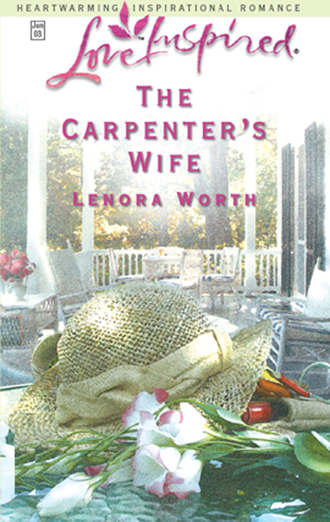
Полная версия
The Carpenter's Wife
That made him think again of Ana Hanson. His mother had left out one trait he thought he recognized in the petite auburn-haired dynamo—ambition. And he remembered another favorite quote from a long-dead philosopher: “Beauty and folly are generally companions.”
She’d come here for companionship. For the warm ocean breezes and wonderful, salty mist of the sea. She’d come here to put down roots and settle in like the sea oats that flowed in wheat-colored patterns down on the dunes.
“I’m going to be a success,” Ana promised herself as she glanced around the large near-empty kitchen of her tea room. “I have to make this work.”
“I think you’re off to a good start,” Jackie Welsh, her just-hired assistant said as she passed by and grabbed her purse off the counter. “I’ll be here bright and early tomorrow to begin training Tina and the other servers.”
“Thanks,” Ana told the tall brunette. “I appreciate your help so much.”
She’d hired Jackie a few days ago, and already they were able to read each other’s minds. She’d need that kind of connection when things got to hopping around here.
Glancing at her watch, she mentally went over her to-do list while she waited for Rock Dempsey. The two-bedroom upstairs apartment was done. Everything was unpacked and in place, and the entire staff had been hired. Over the next month or so, they’d help set things up and learn the menus and recipes by heart. Next week, the furnishings for the shop and tea room would start arriving. She’d have plenty to keep her busy then. Especially if Rock was here every day, measuring and building.
Just thinking of his big, muscular frame in the middle of her dainty treasures made Ana smile. It felt good to smile. She’d been so focused on this venture over the past few months, she’d forgotten how to relax. But now, she was here at last. Here in her own place, with her own living quarters—no roommates, no rent to pay—just a big mortgage that her sister had helped finance—she had no one to answer to except herself. She’d finally accomplished her dream.
Now she had to make that dream work.
She envisioned the wicker bistro tables she’d found at a clearance sale sitting here and there in what once had been the parlor of the house. She saw intimate groupings out on the long porch, where diners would have a clear view of the glistening bay down the sloping yard to the dunes. She’d put some nice cushiony rocking chairs out there, too.
Glancing down at the big bay, Ana saw a sailboat glide by like a giant blue and white butterfly. Maybe she could go sailing herself soon. It had been a long time since she’d sailed out on the water with the sun on her face.
A knock at the stained-glass front door caused her to jump. Not one for woolgathering, Ana scooted across the room, her espadrilles barely making a click on the polished wooden floors. Adjusting her clothes and hair, she opened the door to find Rock standing there in jeans and a T-shirt emblazoned with Save the West Island Lighthouse Summer Jam Session.
“Hi,” she said, smiling as she ignored the way her pulse seemed to quicken each time he looked at her. Then she pointed to the image of the old West Island Lighthouse on his shirt. “You, too, huh? Eloise told me several islanders are working to renovate the lighthouse. And I read about the jam session in that Greta woman’s column. That should be a challenge, from what I hear—raising funds for renovation.”
He entered the room, ran his gaze over the pale cream painted walls and the feminine wallpaper border that depicted shoes, hats and purses from the turn of the century. Then he turned to her.
“I like a good challenge.”
“Well, then, you’ll love the job I have for you,” she replied, her nerves stretching as tight as the rigging on a sail. “I hope…I think I have everything in order.” With a wave of her hand, she strolled around the empty rooms. “As you can see, the walls and floors are done. And I’ve ordered some armoires and side-buffets for displays. They should be here any day now. The major appliances are all brand-new and industrial size—those will be installed this week. Mainly, I need you to take a look at the kitchen cabinets and tell me if they can be salvaged. And I’d like you to maybe redo the walk-in pantry and build some functional shelves in the kitchen, too.”
Rock stood listening, his gaze once again moving over the central hallway and two long open rooms on each side of the front of the house. “The original parlor and dining room—this will be the restaurant area?”
“Yes, diners will be seated in both rooms, but our artwork and other wares will be displayed on the walls and all around the dining tables. Then we have a room in the back for private parties, which will also display a collection of antiques and art. The cash register will be here in the vestibule by the front door. I found an antique counter in an old drugstore in Savannah. It’s being shipped.” She pointed to an open door off the rear of the hallway. “And I have a small office right across from the kitchen. There’s a bathroom back there, too.”
He nodded, made notes on a small pad. “You seem to like the Victorian era.”
“I do,” she said, grinning. “I’ve always loved old things, all periods of history. Maybe because I read a lot growing up—stories of long ago, all about valor and romance.”
“Oh?” He stopped writing and glanced up at her. “I’d figure you’d have been too busy chasing off boys who wanted their own valor and romance, to sit around reading books.”
Blushing, Ana shook her head. “My sister got all the boys. I got my romantic ideas from books.”
He stopped scribbling to stare at her. “I reckon you do look like a Jane Austen kind of girl—all Sense and Sensibility.”
Unsure if that was a compliment, Ana replied, “I’m a little old-fashioned and sensible, but I try not to live in the past.”
“‘The tender grace of a day that is dead…will never come back to me.”’
Stunned, Ana shrugged. It was as if Rock had hit on her deepest, most bittersweet memories with the precision of cupid’s arrow. “That’s…very melancholy.”
“Alfred, Lord Tennyson,” Rock explained. “This house has a tender grace. Maybe it will bring you a little romance…and some comfort.”
Comfort? Was that what she’d been seeking all her life? Ana pushed at the dark memories blocking out the rays of hope in her mind. “Romance I doubt. But I guess I could use some comfort. Anyway, I love this house. And I’m thrilled to be here on the island. We used to vacation here with my parents. I fell in love with Sunset Island and I’ve always wanted to come back.”
“You came from Savannah?”
“Yes. We lived out from Savannah, near Fort Stewart. My parents still live there in a house on the Canoochee River. Tara—that’s my sister—and I attended college at Savannah State.” She stopped, took a breath. “I was a senior when she was a freshman. She got married a year later and never finished college. After I graduated, I moved to Savannah to work in the art gallery.” She lowered her eyes, stared at an aged spot in the floor, memories as rich as the lacquer on the wood coloring her mind. “Anyway, now I’m here. I’m moving forward, even if I do like things from the past.”
Ana quieted, thinking she sounded as if she were trying to convince herself of this. And maybe she was. She still had hurtful memories from her college days, memories that had colored her whole adult life and her rocky relationship with her younger sister. But she was determined to make a new start, with both her life and her sister.
“The past can be good,” Rock said, his keen eyes sweeping over her face. “As long as we keep it in perspective.”
“Oh, I keep it in perspective, all right. I don’t want to ever go back there.”
“Bad memories?”
Ana looked up at him, saw the sincere curiosity in his beautiful eyes. “Some.” Lots. But she wasn’t about to tell him any of that. She ruffled her hair with her hand. “Do you want to see the kitchen?”
“Sure.”
She started toward the back of the house, heard him behind her, then willed her heart and her head to stay calm. Ana reminded herself that she’d given her heart to a man once, only to have it returned bruised and battered.
She would never make that mistake again. Even if this handsome preacher named Rock did cause her to think of romantic things like strolling on the beach at sunset and intimate dinners by candlelight.
Ana would stick to her art, her cooking and her books. Those were safe, tangible things.
Love wasn’t safe. That “tender grace,” as Rock had quoted, would never come back to her again. She was all business now. And all on her own.
If only Rock Dempsey’s eyes would stop looking at her with that anything-but-business gaze.
This woman meant business.
Rock had measured, suggested, tested, rearranged, gauged and decided on what could be done for the beautiful old cabinets in the long, sunny kitchen. A good stripping of old paint, some new hardware and a lot of wood restorer and varnish would make them shine like new. That part had been easy.
But testing and gauging Ana Hanson—ah, therein lay the challenge of this assignment.
She had been hurt somewhere in the past. Maybe during her childhood, maybe during her college years. But something had left her unsure and unsteady, even if she did try to present a calm, capable facade to the world.
Rock had no doubt she was capable. She seemed as intent on making her tea room a popular tourist attraction as his mother did on creating intriguing artifacts from rocks and stones. That ability to focus should serve as a warning to Rock. Ana held many of the traits he’d seen too many times in his mother—that tendency to shut everything out, that need to finish the work, create the next sculpture piece, or, in Ana’s case, create a haven for fine art and good food.
There was nothing wrong with that. But Rock wondered if Ana was pouring all of her strength into this new venture because she was running from the past. Running from herself, just as his mother had done most of her life.
Turning to see where she’d flittered off to this time, Rock found Ana standing on a footstool wiping one of the big bay windows in the front parlor. He almost called out to her, but then the way the last of the sun’s rays were gleaming all around her from the open west window on the other side of the room caused him to stop and just watch.
She stood in the soft wind, her dark red hair shining in the soft afternoon sun. Her skin was glistening with a golden creaminess. She’d changed clothes since this morning and now her long floral skirt moved around her like a flower garden.
Rock took this picture in, and realized it had been way too long since he’d been out on a date with a pretty woman. And taking old Miss McPherson to the seafood market once a week didn’t count.
“You hungry?” he heard himself saying.
Ana turned, almost too fast. She nearly fell off the stepstool. Rock wasn’t fast enough to catch her, and he was glad. That would have been a classic romantic way of getting her into his arms—too obvious.
But since he didn’t want to look unchivalrous, he did step forward. “Steady there.”
“I’m fine,” Ana said, stepping down from the stool to turn and stare at him as she pushed her hair away from her eyes. “I must have misunderstood you, though. I thought you asked me if I was hungry.”
“No misunderstanding. I did—ask you that, I mean.”
She stood there with her hands on her hips, an almost doubting glare on her pretty face. “Why did you—ask?”
So she was the suspicious type. “No particular reason, other than it’s getting dark and…I only had a sandwich for lunch. I was thinking about fried catfish out at the Sunken Pier. Ever been there?”
“No.”
“No, you’ve never been there, or no, you aren’t hungry, or just plain ‘no, I don’t want to have dinner with you, Rock’?”
“No to the first, yes to the second, and…I’m not sure to the last part.”
He crossed his hands over his chest, his trusty pocket notepad clutched in one hand. Then he leaned forward, offering up what he hoped was his best smile. “Why aren’t you sure? It’s just a meal. We can go over the cabinet plans again.”
She frowned, looked around. “I guess we do need to finalize everything—set your hours, your fee, things like that.”
“Exactly. A business dinner.”
“Strictly business.”
“Wouldn’t dream of having it any other way.”
He liked the trace of disappointment that had scurried through her green eyes. But he wouldn’t dare tell her that since she’d walked into his shop this morning, he had at least thought of having things another way—besides the strictly business way, that is.
“I’ll freshen up and get my purse,” she said, clearly as confused and unsure as she’d been two minutes ago. “We won’t be late, will we? I have so much paperwork—contracts with food vendors, inventory sheets to check over—”
“I’ll have you home at a reasonable hour, I promise.”
“Okay, then.”
“Okay, then.”
“You know, Mark Twain said principles have no real force except when one is well fed.”
She rewarded him with a smile. “And you are clearly a man of principle.”
“That I am. And manners. My mama taught me both.”
“That I can believe,” she said, her expression softening. “I trust your mother’s opinion and her good judgment of character, even if you are her son and she has to recommend you on that basis alone. I think I’ll be safe with you.”
“Completely.”
But as Rock watched her hurry up the narrow staircase, he had to wonder how much he could trust his mother’s judgment. After all, Eloise had brought Ana and him together for her own maternal reasons.
And now Rock was worried about those reasons and about how being with this shy, old-fashioned woman made him feel.
The real question was—would he be safe with Ana Hanson?
Chapter Three
“And that’s how it got its name,” Rock said, waving a hand in the air toward the old partially sunken pier just outside the wide window.
Ana watched as he smiled, but the smile didn’t quite reach his eyes. They held that distant darkness that seemed to flare like thunderclouds now and then. He looked down at his plate, then shrugged. “There’s a lot of history on this old island.”
Ana laughed, then nibbled the remains of her baked trout. “So you’re telling me that pier used to be completely safe and sturdy, until twenty years ago when a hurricane came through and almost swept it into the sea? And because of that and the restaurant’s legendary name, no one wants to fix the pier now?”
Rock nodded, grabbed a crispy hush puppy, then chewed before answering. “The first restaurant got washed into the ocean. That was the original Seafood at the Pier fine dining establishment. It had been here since 1910. But after the hurricane, the only thing left was that part of the pier that’s sticking up from the water now. A good place for pelicans and egrets to perch. The owner’s son decided to rebuild under a new name—thus The Sunken Pier Restaurant. Been here and been going strong ever since, through storms and summer tourists alike, frying up fish and steaming up shrimp and lobster, oysters and clams—whatever bounty the sea has to offer.”
Ana stared out the window at the ocean. Dusk had descended over the water in a rainbow of pastel hues—some pinks and reds here, and a few mauves and blues there. The water washed against the ancient remains of the old pier, slapping against the aged wood pilings in an ever-changing, but never-ending melody of life. And what was left of the pier looked somehow symbolic of that life. The thick beams and timbers lay at a haphazard angle, crossways and sideways, like a pile of kindling, stopped in time in mid-collapse.
Ana thought that her own life seemed like that—at times she felt about to fall apart at any minute, but at other times, she dug in, refusing to give up in spite of being beaten down at every turn.
She looked back over at Rock. “I guess I can understand why they left it that way. It’s a reminder of sorts.”
“Exactly,” he said, bobbing his head, a bittersweet smile crinkling his dark-skinned face. “My mother even did a sculpture based on that pier. She called it The Resurrection because the crossbeams of some of the pilings made her think of a cross. She made it out of wood and iron, with a waterfall flowing through it to represent the ocean and life.”
“Where is this sculpture now?” Ana asked. “I imagine some collector snatched it up right away, but I don’t recall seeing it in any of the trade catalogues or art books.”
Rock’s eyes darkened again and the smile disappeared from his face. “You probably never saw it because it wasn’t for sale. But someone acquired the piece, anyway, many years after she’d finished it. Locked it away in a garden behind his fancy mansion up on the bluffs.”
Sensing that Rock didn’t approve of this particular art collector, Ana leaned forward. “Isn’t that a good thing? That your mother sold the piece, I mean?”
He lifted his chin. “Normally, yeah, that’s good, selling a fine piece of art. But she didn’t get a very good price for what she had to give up.”
And that’s all he said. Wondering why he insisted on talking in riddles, Ana watched as he took a long swallow of his iced tea. “Rock,” she said, “did I ask the wrong question?”
Rock glanced over at her as if he’d forgotten she was even there. “No, nothing like that. Let’s change the subject.”
Ana again got the impression that Rock somehow resented his mother’s art. Maybe because it had taken his mother away from him and his brothers? It was a known fact in local art circles that Eloise Dempsey was a woman driven by her talent, a woman who had worked long and hard to become a successful force in the art world. It was also known, from various interviews and articles written about Eloise, that her relationship with her three grown sons was difficult. And even though Eloise knew exactly what to say in order to protect her privacy, she still managed, when necessary, to get a good sound bite on the evening news.
Deciding to venture forth, Ana said, “You know, Rock, I’ve read articles in the trade magazines about your mother. Being an artist is never easy. The art demands a lot, but you and Eloise seem so close. She brags on you—on all of her sons—and she did recommend you to me.”
Rock held his tea glass in one hand while he watched the waves crashing against the seawall and pier outside. “We’ve managed to stay on good terms over the years, in spite of what the media might say. And in spite of what the world doesn’t know or see.”
Thinking he wasn’t going to elaborate, Ana could only nod and sit silently. She didn’t want to appear nosy, yet she yearned to understand what had brought that darkness to his beautiful eyes. “It must have been hard on all of you, losing your father when you were so young.”
“It was tough,” Rock finally said. “For a long time, we didn’t understand why he had to die out there doing what he loved best, shrimping.” He glanced out at the water again. “But then ‘deep calleth unto deep’ or so the scripture says.”
“Did he die in a storm?”
“Yes.” Rock nodded toward the toppled pilings. “The very same hurricane that took that pier.”
Ana let out a little gasp that caused him to look across the space between them. “I’m sorry, Rock. Is that why you don’t want to talk about the sculpture?”
He sighed, kept staring at her, his eyes now as dark and unreadable as the faraway waters over the distant horizon. “It’s not the sculpture, Ana. It’s the fact that my mother designed it out of grief and sorrow and made it into a beautiful symbol of redeeming love. She didn’t sell the sculpture. She gave it to…someone who doesn’t really appreciate it.”
“Can you tell me who?”
Rock set his glass on the table, then folded his hands together across the white linen tablecloth. “I can tell you exactly who, and exactly why. My mother gave that sculpture to my brother Stone. And she gave it to him as a way of asking his forgiveness. Stone took the sculpture, but he has yet to forgive my mother…or me.”
Ana had many more questions, but decided they had to wait. She wouldn’t press Rock into talking about his obviously strained relationship with his middle brother, Stone. From what Ana knew, each of the three Dempsey brothers was successful in his own right. But Stone Dempsey was probably the most successful, business-and money-wise. She’d read somewhere a few years ago that Stone had bought Hidden Hill, a big stucco and stone turn-of-the-century mansion sitting atop the highest bluff on the island, not far from the West Island Lighthouse. But the mansion was crumbling around its foundations, from what Ana had heard. Which meant Stone had to have a lot of money to pour into restoration and renovations, at least.
Did Rock resent his brother’s success?
As they strolled along the shoreline heading back to Rock’s car, Ana couldn’t picture this quiet, talented man resenting anyone because of money. Rock seemed content enough. He had a lovely cottage near the Ankle Curve and he had his little church. He had his own talent, too. His cabinetry work was exquisite. His restoration of old pieces was precise and loving. Based on his ideas, he would turn her kitchen into a functional, but charming, workplace.
So what was eating at this gentle preacher? Ana wondered.
“I guess you’re wondering why I said that about Stone,” Rock told her as he took her hand and guided her a few yards away from the pier and the restaurant to a craggy rock that looked like a readymade bench.
“You don’t have to explain,” she said, taking in their surroundings. Seagulls lifted out overhead, searching for tidbits from the diners strolling along the boardwalk and dunes. “I have…a very delicate relationship with my sister, so you’re allowed the same with your brother.”
“Stone…is bitter,” Rock said. “He blames my mother for our being so poor when we were growing up. You see, she gave up her inheritance to marry our father. His name was Tillman. Everyone called him Till. Till Dempsey, a kid from the wrong side of Savannah. He had the audacity to fall in love with the beautiful debutante from one of the oldest families in Savannah.” He pointed to the big curved rock. “And he brought Eloise here to propose to her. It’s an island tradition.”
A marker sign standing beside the rock stated that this was the Wedding Rock, a place where down through the centuries, sailors and fishermen had proposed to their true loves before heading out to sea. The sign also said that often couples got married here in front of the rock, their faces turned toward the ocean as they pledged their love.
“My parents were so in love, they didn’t care about all that old money back in Savannah. But when my father died, my grandparents tried to make amends. They wanted us to come live with them in Savannah, but on their terms, of course. My mother refused to conform, so we stayed here in what was once the family vacation home, the house she lives in now—the only thing she accepted from her parents—and that was just so we’d have a roof over our heads. Stone got angry with her for refusing their help and their money, and I guess he never got over it. I tried to make him see that we didn’t need them, but he was just twelve years old—you know, that age where peer pressure makes life so hard.
“The other kids teased us because we wore old clothes and couldn’t afford the things they took for granted. Stone resented our mother for that. I rode him pretty hard back then, trying to make him see that we were going to be okay. But we weren’t okay, really, and I guess I wasn’t the easiest person to live with. Stone hasn’t forgotten. It’s not something we like to talk about.”
Ana finished reading the historical marker, then turned to Rock. “If you don’t like talking about this, why did you bring me here to this particular restaurant?”
“The food is good,” he said with logical clarity.
“But the memories—”









